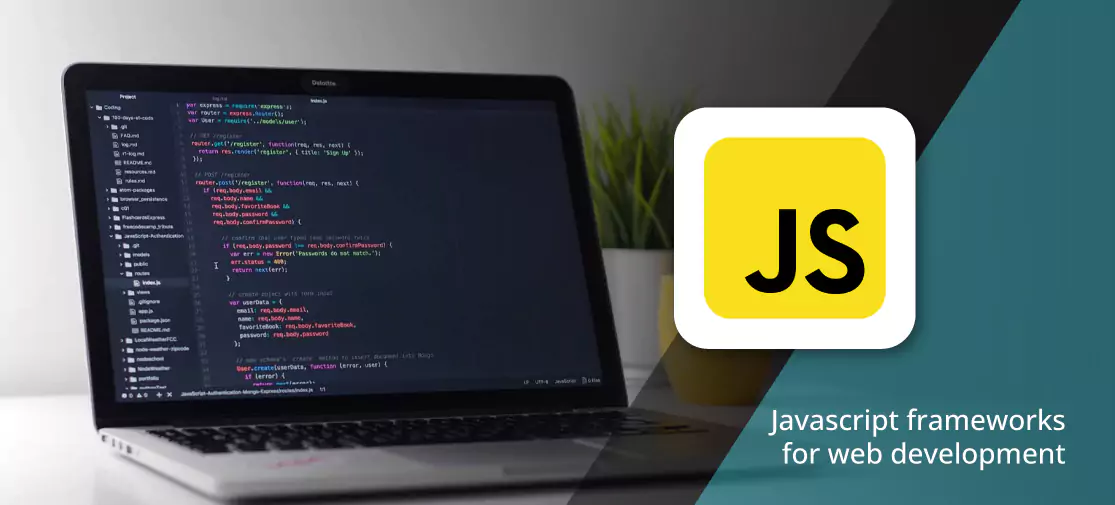Introduction
Currently, every organisation offers Web development services, every business needs a robust and user-friendly website, and when it comes to developing a website Javascript is the first thought for every developer.
In simple words, Javascript can be defined as a text-based programming language that is used both on the client and server side allowing you to create interactive website applications for your company. The reason behind relying on Javascript is simple it allows you
- To implement complex features on a webpage.
- Displaying timely update contents.
- Implementing 2D/3D graphics.
- It makes your code more readable.
So, there is no doubt that Javascript is the most popular and widely used programming language. But for at least the past decade javascript has been gradually filtered through the Javascript framework.
What is javascript framework?
In simple terms, a Javascript Framework is defined as a collection of Javascript code libraries that provide a web developer with pre-written code for routine programming tasks. It provides a basic foundation to the developers which is necessary for building Javascript applications as it saves developers effort for building web applications from scratch.
Benefits of javascript framework
The Javascript Framework is considered a boon for the developers allowing them to create simple and attractive websites without any hassle. The benefits of the framework can be followed as
- Updated code: The framework includes scripts and templates that make it easier for the developers to edit, test, and update. Moreover, it extends HTML making it easier to specify components and changes.
- Seamless routing and transitions: It provides smooth routing and transitions. Frameworks are capable of handling page loading and client requests by which the developers need not create a webpage from scratch. Moreover, it also provides various features such as animation and 2D/3D effects.
- Better user interface elements: Interface plays a vital role in every web development as it converts your potential customer into a purchaser. Javascript framework provides elements that receive input and produce HTML or React elements. Additionally, Javascript frameworks make it simpler to learn and manage unidirectional data flow to programmers and businesses and can be used to visualise User Interface elements and simplify writing components.
Best javascript framework for developers
As we know, there are various types of frameworks available out there as every framework offers different functionality according to the business requirements. So here we have listed various types of Javascript frameworks that help the developer and your organisation to create an interactive and attractive website for your user. So let’s begin with
React.js
It’s a free, open-source front-end JavaScript framework. It mainly focuses on creating interactive interfaces more efficiently and effectively with less code and effort. Moreover, it allows you to develop your applications by creating reusable components that are individual pieces of a final interface.
Features
- Interaction with any application as it’s more simple due to its DOM (Document Object Model).
- It’s a one-way flow of data which is more intuitive than bi-directional data binding.
- It has reusable components making it easy to develop websites.
- Allows you to apply changes immediately due to its instant reload feature.
So when you require a better UI/UX interface for your website React.Js is the framework for your organisation.
Vue.js
It’s an open-source model-view-viewmodel (MVVM) which is a front-end javascript framework. Vue.Js itself is a progressive Javascript framework that mainly focuses on the view layer only. It must be new in JS frameworks but it’s still used due to its various features such as
Features
- The components contain reusable codes and predefined options for custom elements.
- It uses an MVVM structural pattern which separates it from GUI (Graphical User Interface).
- It can also create a high-end single-page application with dual integration mode.
- It’s based on HTML, CSS, and Javascript language.
This makes it easy for the developers as every part of the app can be tested independently even more the coding is also quite simple to understand.
“Also Read: What Is Javascript And How Do They Work”
Angular.js
It's one the frameworks that is a free and open source javascript web-based framework that is maintained mainly by Google and used for developing single-page applications. Moreover, AngularJs supports both small and big applications.
Features
- It gives free control over adaptability.
- Provides simple and effective templates.
- It’s a two-way process by which updates are done automatically.
- Codes can be reused to meet a particular target.
It's a framework that extends HTML syntax allowing the developers to build rich internet applications.
Node.js
It’s one of the most used frameworks as it’s a cross-platform open-source server that can run on various platforms. Node.Js is a runtime environment that executes Javascript outside a web browser.
Features
- It reduces the processing time so, there is hardly any buffering.
- It's based on the Single Thread Loop Model which can handle multiple client requests.
- It’s highly scalable as it operates asynchronously.
- The codes are reusable while moving to another runtime environment.
We can say the main purpose that developers rely on Node.Js is that it’s capable of collecting data for multiple source points.
Phaser.js
It’s a Javascript framework that focuses mostly on web gaming. It’s fast and a free open-source HTML5 game framework. It allows you to create games in the browser.
Features
- It's a cross-platform gaming application.
- It uses both Canvas and WebGL internally.
- It allows the player to implement and make it movable.
- It can create simple shapes, make levels, or create loading screens.
So, if your organisation is into the gaming sector then Phaser.Js is the must-use framework for your business.
Electron.js
A framework that is mostly used to design desktop applications using web technologies which is a free open-source software as well. It uses Javascript, HTML, and CSS language.
Features
- You can maintain a single JavaScript codebase.
- It creates cross-platform applications.
- It’s faster than native apps as it only loads necessary components.
- The Windows installer does not require any configuration.
All these necessary tasks are essentially handled by Electron JS, allowing the developer to focus on the main aspect of their application.
Express.js
It’s a node.js application framework that offers various features to the developers for creating mobile and web applications as it allows to build single, multiple, and Hybrid web development.
Features
- It’s a customizable framework.
- It’s used in both backend and frontend and backend development.
- It gets linked quickly to databases like MySql and MonoDB.
- It provides templates to create dynamic content.
Express Javascript framework that is built on top of Node.js which manages servers and routes.
Next.js
It’s a framework that allows you to build blocks for your web application. This open-source framework handles the tooling and configuration as structure, features, and optimization for your application.
Features
- It includes image optimization and analytics.
- It supports TypeScript programming language.
- Capable of handling high traffic loads and adapting to user demands.
- Allow you to experience fast page load and smooth user experience.
Next.js just does not support server-side rendering but it’s also beneficial for search engines, crawling, and indexing of web pages.
Nest.js
When it comes to creating scalable and efficient server-side scripting language Nest.Js is used. It’s an open-source backend framework that is built on top of the Node .js framework.
Features
- Allows them to create reusable codes and organise their application into logical modules.
- Provides core modules to handle common tasks.
- It provides a controller layer that manages incoming HTTP requests and returning responses.
- Pipe is also one of the features used for tasks such as data validation, sanitization, and transformation.
Next.js supports Typescript programming language that solves performance and maintenance applications by providing compile errors and warnings.
Ember.js
This open-source javascript web framework allows developers to create scalable single and progressive web applications. It’s mostly used in client-side websites with the use of MVC (Model View Controller) architecture.
Features
- HTML and CSS are the core of the development model.
- It offers instant initializers.
- The core is the route feature that manages URLs.
- It also includes a two-way binding feature as well.
Ember.Js gives the best outcome when your entire website is completely client-sided.
Backbone.js
It’s a rich-web app framework based on the MVC architecture. The main purpose of Backbone Javascript is to add interactivity such as event handling to static HTML pages.
Features
- Create app features on frontend through the Javascript function.
- Provide different building blocks for your web apps.
- Updates the HTML code automatically.
- Manages your code systematically, organised, and simple.
It’s considered the best choice when you are willing to create a flexible JavaScript framework with a simple model.
Meteor.js
It allows you to develop a single Javascript language for application servers, web browsers, and for mobile devices. It’s considered a full-stack web development server.
Features
- It supports any database with a Node.js driver.
- Flexible to create Android and iOS applications.
- Meteor also offers cloud services to host meteor apps.
- It allows you to create cross-platform code.
Meteor Js includes a set of technologies that allows the developer to create connected-client applications focused on Node.js and JavaScript.
Choose the right javascript framework
As we know frameworks are essential for every mobile and web application but at the same time it’s crucial to know which frameworks are suitable for your organisation. So, here are some key points to be kept in mind.
Features
- Toolstack: Make sure that the framework is used as a front-end programming language.
- Performance: If offers a top-notch performance that meets the basic necessities of your organisation.
- Complex: It should be simple and easy to learn as there are some frameworks that are quite complex which may offer better features as well.
Conclusion
So, over here the conclusion clearly explains that every Javascript Framework has different things to offer but, when it comes to creating an application using a Javascript framework is not a must but it’s a basic necessity for the organisation.




